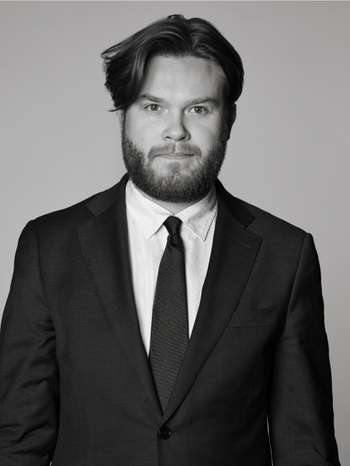Hilma af Klint
"Julklappen"
Signed H. af Klint. Watercolour, image area 40 x 51 cm.
Provenance
Private Collection, Sweden.
Thence by descent.
Literature
Kurt Almqvist och Daniel Birnbaum (red.),"Hilma af Klint, Catalogue Raisonné", book 7, Bokförlaget Stolpe, Stockholm, 2022, illustrated p. 302.
Artist
Hilma af Klint (1862-1944) was a Swedish painter, theosophist and pioneer within abstract painting, and already in 1906 had created an abstract visual language. This was several years before Wassily Kandinsky, Piet Mondrian and Kazimir Malevitj who are still considered the forerunners of abstract art in the 20th century. Klint began her artist training at the Technical School in Stockholm (now Konstfack), where she also took lessons in portrait painting. After her studies, Klint acquired her own studio by Kungsträdgården where she painted and exhibited landscapes in naturalistic styles.
It was during a trip to Switzerland where she met Rudolf Steiner and was taken by his anthroposophical ideas and thereafter developed a strong interest for the occult. During séances, she received messages, which she transformed into abstract paintings. In 1986 Klint showed her abstract work for the first time in the exhibition, ‘The Spiritual in Art’, Abstract painting 1890-85, in Los Angelese. This exhibition came to be Hilma af Klint’s international breakthrough.
With a solo exhibition at the Modern Museum in Stockholm, Klint started a new phase of her artistic career. This became the most wrote about exhibition in the history of the Modern Museum and made Klint into a well-known name worldwide. Since 1972 her abstract work has been managed by the Hilma af Klint Foundation. The Modern Museum in Stockholm has a room dedicated to Hilma af Klint in their permanent exhibition, where the works shown are regularly rotated. She is even represented by the National Museum, the Royal Library, the Maritime Museum, the Nordic Museum and Uppsala’s University Library.












































